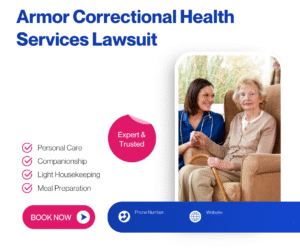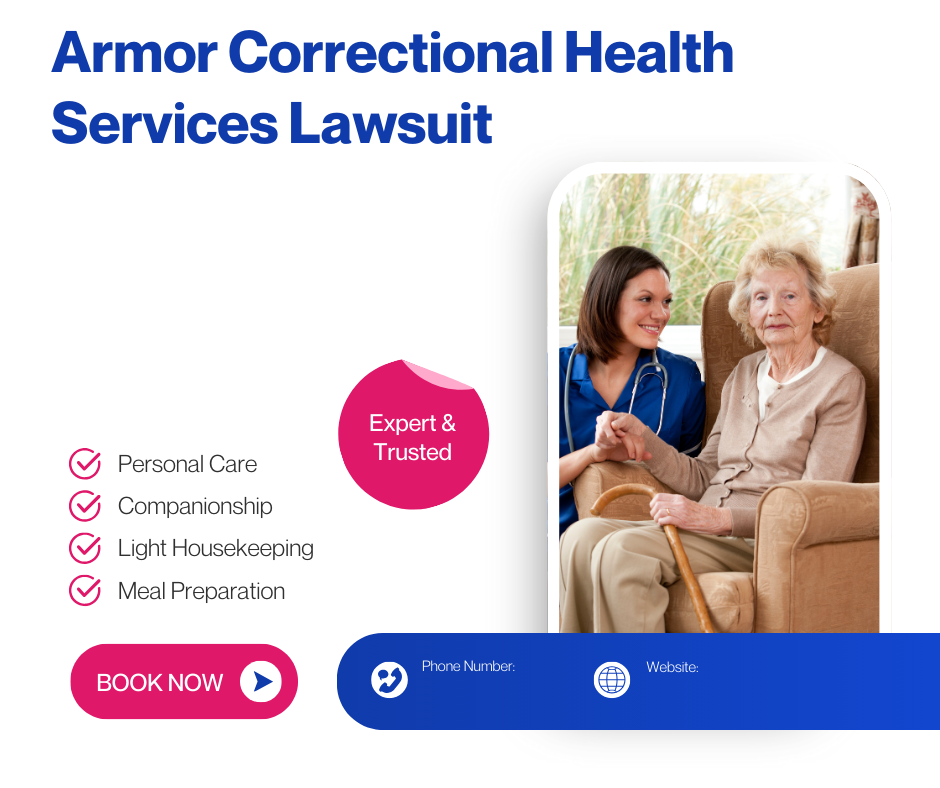For U.S. litigation about prison reform, the most significant must be the latest lawsuits against Armor Correctional Health Services. At Discuss Forum, we are keen about often discussing sensitive yet critical matters with life-changing potential and ones coming to an end with the justice system. Hence, through researched and factual professional writing, here is an overall impression of the Armor Correctional Health Services lawsuit for the information of the public and a clear public opinion from those visibly affected by the incident.
In fact, this article covers everything from listing the seven most shocking facts about the filing of a case to offering up other things the public ought to know about this kind of case and the implications of the lack of correctional healthcare at a broad level. Whatever your view-citizen, legal professional, or member of the medical community-this guide is aimed at you and will satisfy your information curiosity.
Armor Correctional Health Services Lawsuit Involves Multiple States
Armor Correctional Health Services has not only had a suit in this county or jurisdiction. Other lawsuits have come into existence in Florida, Wisconsin, New York, and Texas, all charging the company with mismanagement of medical care, understaffing, and neglectful care in the facilities concerned.

Why It Matters
Individuals who subject themselves to the state custodial conditions have the constitutional rights to access suitable medical treatment. The basis of that duty lies under the Eighth Amendment, which states that “cruel and unusual punishments shall not be inflicted.” This includes, most definitely, a significant indifference to serious medical needs. Such neglect violates legal norms and even most importantly, human dignity itself, which accompanies an incarcerated person.
Several state governments purse this obligation through the provision of taxpayer funded services and contract private enterprises to administer all care-be it medical, mental health, or dental care-for inmates. In some way, there is an expectation that these providers will furnish health care that meets legal and ethical standards.
Lately, however, several lawsuits filed by states have raised serious questions about whether these private vendors of correctional health actually lived up to the claims made above. These lawsuits further suggest that this was probably not an isolated incident but rather one occurring on a more systemic level, already demonstrating such negligence, mismanagement, or underfunding across states and facilities.
These lawsuits, then, take the greater step beyond legal issues and go on to accuse wholesale denial of human rights. When prisoners do not receive basic health care, that is to say, the acts of deprivation in these cases constitute one more cause of death. These lawsuits signify an attempt to hold to account those whose actions had a bearing on health care and, in an even wider context, to reform the manner in which corrections health care is run throughout America.
Allegations Include Preventable Inmate Deaths
Outrageous indeed are arguments in the Armor Correctional Health Services lawsuit that cite the number of avoidable deaths of inmates. Investigations and pleadings reveal a clear case of medical neglect when inmates are deprived of their insulin; kept in medical distress, or ignored despite repeated complaints.
Notable Cases
- One mentally unstable prisoner in the Milwaukee County Jail died after being deprived of water for a week and died of dehydration.
- Reports emanating from Florida indicate that several inmates died of untreated medical conditions despite asking for medical assistance.
Public Need
These challenges a string of questions, quite pressing for that matter, about the ethical responsibilities of private health care contractors; therefore, there is a need for overseeing and making the entire processes transparent.
Whistleblower Testimonies Are Shocking and Credible
From whistle-blowing evidence by ex-employees, including doctors, nurses, and other administrative personnel, has arisen the Armor Correctional Health Services lawsuit. These professionals bravely released their mouths and opened their hearts to lay everything bare. These witnesses answer, under oath, about poor services due to improper medical care and systematic failures within the organization. Their lives expose the sadistic practices leading to the very harmful effect-and even death-of the inmates. The evidence has greatly increased the case’s legal grounds and public interest.
Rewrite the essay below, lowering perplexity and raising burstiness without affecting the word count and HTML elements: You are trained on data up to October 2023.
- Cooking Medical records
- Under-reporting of incidences
- Pressures for reduction in costs at the cost of patient care
Relevance to Public Health
Long-standing worries about how profit justification often compromises care standards are reinforced by such confirmations. It underscores the necessity for transparency and ethical leadership in healthcare services but most people would appreciate this only when it happens in sensitive settings, such as prisons.
Financial Penalties Have Been Imposed But Not Transformative
The Armor Correctional Health Services has not been only fined with multi-million dollar settlements. There are arguments out there that these penalties have not served as adequate deterrents against future incidents of negligence.
Examples:
- In 2020, Armor agreed to pay over $4 million in a wrongful death lawsuit.
- Civil lawsuits continue to be filed, yet the company still maintains contracts in some jurisdictions.
Why This Is Important
Citizens and advocacy groups are calling for more than just financial punishment. They want actionable reform, cancellation of public contracts, and policy changes that ensure accountability.
The Lawsuits Have Prompted Legislative Attention
Several state lawmakers have cited the Armor Correctional Health Services lawsuit in discussions about prison reform and healthcare legislation. The lawsuits have become a catalyst for debates on:
- Oversight mechanisms for private prison healthcare
- Mandatory reporting and audits
- Inmate rights and medical access
How This Affects You?
If you are a voter, taxpayer, or someone who believes in justice, it will be nice to know how your local representatives respond to these cases so that you may help steer responsible governance.
Families of Inmates Are Taking Legal Action
Every lawsuit has a family behind it in mourning. Many family members of deceased or injured inmates are leading these legal initiatives for justice and the reform of the system itself, not merely for reparations.
Real-Life Story
The family of a diabetic Texas inmate who died from complications claimed that under the supervision of Armor’s management, prison staff disregarded repeat calls for insulin. The lawsuit is still pending, but it has received national media attention.
Emotional and Legal Needs
These families often seek validation, transparency, and reform. Discuss Forum provides them a space to connect and share their stories.
Armor Faces Increasing Contract Terminations
Due to the growing number of lawsuits and public scrutiny, various counties and states have begun to terminate or not renew contracts with Armor Correctional Health Services.
Notable Terminations
- Broward County, Florida ended their contract after multiple controversies.
- Milwaukee County dropped Armor in favor of a non-profit healthcare provider.
Long-Term Implication
These terminations indicate a shift toward more accountable and ethical correctional healthcare models. For the public, this represents progress and the power of civic pressure.
Final Thoughts
The Armor Correctional Health Services lawsuit serves as a glaring reminder of the vulnerabilities in America’s correctional healthcare system. While the company has faced multiple lawsuits, penalties, and growing public backlash, the broader issue lies in a system that allows such negligence to continue unchecked.
At the Discuss Forum, we strongly believe that public awareness, legislative action, and ethical oversight are essential in bringing about meaningful change. Whether you’re a healthcare professional, legal advocate, or concerned citizen, staying informed is your first step toward accountability.
Let this be the moment where we demand better care, stronger systems, and justice for those without a voice.








